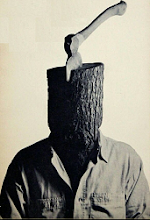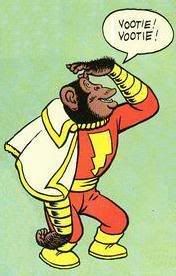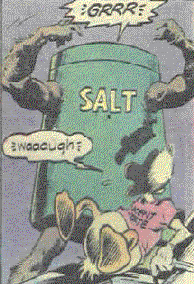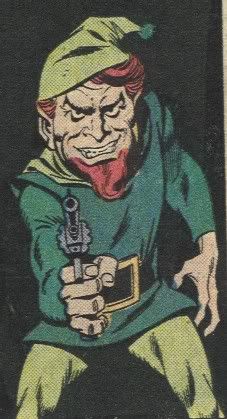A Lake of Hot Chocolate: Stan Freberg Shows the Way
Oni Press recently put out an original graphic novel about a heist in the old west, entitled The Long Haul. It’s not bad, it’s not great. The story, by Antony Johnson, is nothing spectacular or original. The art, by Eduardo Barreto, is attractive and well-done. I don’t regret buying it, though I wish the story were richer or less predictable.
More than anything, the book was a let-down. The novel didn't justify its existence as a graphic novel very well.
The Long Haul’s shortcomings reinforce the wisdom of Stan Freberg.
Freberg loved the medium of radio. The Stan Freberg Show (1957) experimented with the possibilities of the radio show. He knew the medium was endangered by the growth of television, and that to capture the public’s attention, he had to play to his medium's strengths.
In an early episode of the series, Freberg demonstrated the advantage radio holds over television. He began a segment by draining Lake Michigan and filling it with hot chocolate. Dump trucks pulled up to the shore and dumped whipped cream onto the lake. Finally, the Royal Canadian Air Force dropped a cherry onto the top of the lake, to the cheers of 25,000 observers.
He ended the segment with a challenge: “Let’s see them do that on television.”
The Long Haul, like a lot of original graphic novels, doesn’t take Freberg’s wisdom to heart. It never employs the unique tools and charms of the comic medium.
For the life of me, I couldn’t figure out why it was published as a graphic novel instead of a prose one. The story would not have lost any of its effect had it been only words on a page.
Flipping through the many original graphic novels stacked in my local comic shop, I see this same problem over and over. Why bother? Why go to the hassle of illustrating the story if it would be just as well served by prose, and cost a fraction as much to produce or buy?
This isn’t to say that comics need to be filled with astonishing visuals of breakdancing dinosaurs or jive-talking robots (though yes, both would be welcome additions to most graphic novels). Movies can show even more spectacular sights now, due to computer graphics.
Beyond the ability to cheaply portray the fantastic, comics have unique capacities.
Take, for example, Jimmy Corrigan, the Smartest Boy on Earth, by Chris Ware. Jimmy Corrigan tells the story of a pathetic middle-aged man meeting his long-lost father. Ware created the story in a way that cannot be translated into another medium without crippling it. The positioning of panels, the parallel flows on a single page, the distinct art style, all add depth and richness to the story. Snazzy.*
Then there's a unique capacity that’s so commonly accepted nobody talks about it anymore: no medium can pace like comics.
Take a typical super-hero comic. Page one: six panels of Captain Spiffy in his apartment, playing canasta with his talking cockatiel, Buford. Page two: a splash page of the dreaded Rear Admiral bursting through the apartment wall, cackling madly and throwing wedgie-bombs.
No other medium can do this shift of pace and visual impact. None. The sudden shift from lots of small panels to large ones; the addition or removal of backgrounds; the addition or removal of panel borders; all are unique to the medium.
The Long Haul didn’t take much advantage of these tools. Couple that with a lack of arresting visuals, and you get a book that may as well have been a prose novel.
I keep wanting to find good original graphic novels. Novels that justify the price tag. If the book doesn’t use the medium’s strengths, why pay the extra ten bucks to have the story printed with useless or redundant pictures?
Listen to Stan Freberg, kids.
Stan shows us the way.
--------------------
*Though I must admit that Jimmy Corrigan is not a book I either enjoy or recommend. As a guide to the mechanics of comic storytelling, it’s invaluable. Technically, it’s brilliant. As a story, it’s akin to being cornered by a depressive cousin at a family gathering and having to stand by the punch bowl as he yammers for hours about the bleakness of his life and the despair that haunts his days. Dude, shut up. Say something insightful about your despair or go away.
More than anything, the book was a let-down. The novel didn't justify its existence as a graphic novel very well.
The Long Haul’s shortcomings reinforce the wisdom of Stan Freberg.
Freberg loved the medium of radio. The Stan Freberg Show (1957) experimented with the possibilities of the radio show. He knew the medium was endangered by the growth of television, and that to capture the public’s attention, he had to play to his medium's strengths.
In an early episode of the series, Freberg demonstrated the advantage radio holds over television. He began a segment by draining Lake Michigan and filling it with hot chocolate. Dump trucks pulled up to the shore and dumped whipped cream onto the lake. Finally, the Royal Canadian Air Force dropped a cherry onto the top of the lake, to the cheers of 25,000 observers.
He ended the segment with a challenge: “Let’s see them do that on television.”
The Long Haul, like a lot of original graphic novels, doesn’t take Freberg’s wisdom to heart. It never employs the unique tools and charms of the comic medium.
For the life of me, I couldn’t figure out why it was published as a graphic novel instead of a prose one. The story would not have lost any of its effect had it been only words on a page.
Flipping through the many original graphic novels stacked in my local comic shop, I see this same problem over and over. Why bother? Why go to the hassle of illustrating the story if it would be just as well served by prose, and cost a fraction as much to produce or buy?
This isn’t to say that comics need to be filled with astonishing visuals of breakdancing dinosaurs or jive-talking robots (though yes, both would be welcome additions to most graphic novels). Movies can show even more spectacular sights now, due to computer graphics.
Beyond the ability to cheaply portray the fantastic, comics have unique capacities.
Take, for example, Jimmy Corrigan, the Smartest Boy on Earth, by Chris Ware. Jimmy Corrigan tells the story of a pathetic middle-aged man meeting his long-lost father. Ware created the story in a way that cannot be translated into another medium without crippling it. The positioning of panels, the parallel flows on a single page, the distinct art style, all add depth and richness to the story. Snazzy.*
Then there's a unique capacity that’s so commonly accepted nobody talks about it anymore: no medium can pace like comics.
Take a typical super-hero comic. Page one: six panels of Captain Spiffy in his apartment, playing canasta with his talking cockatiel, Buford. Page two: a splash page of the dreaded Rear Admiral bursting through the apartment wall, cackling madly and throwing wedgie-bombs.
No other medium can do this shift of pace and visual impact. None. The sudden shift from lots of small panels to large ones; the addition or removal of backgrounds; the addition or removal of panel borders; all are unique to the medium.
The Long Haul didn’t take much advantage of these tools. Couple that with a lack of arresting visuals, and you get a book that may as well have been a prose novel.
I keep wanting to find good original graphic novels. Novels that justify the price tag. If the book doesn’t use the medium’s strengths, why pay the extra ten bucks to have the story printed with useless or redundant pictures?
Listen to Stan Freberg, kids.
Stan shows us the way.
--------------------
*Though I must admit that Jimmy Corrigan is not a book I either enjoy or recommend. As a guide to the mechanics of comic storytelling, it’s invaluable. Technically, it’s brilliant. As a story, it’s akin to being cornered by a depressive cousin at a family gathering and having to stand by the punch bowl as he yammers for hours about the bleakness of his life and the despair that haunts his days. Dude, shut up. Say something insightful about your despair or go away.





17 Comments:
hi. this is mary bellis. do you know me?
By Anonymous, at 8:37 PM
Anonymous, at 8:37 PM
Not off the top of my head, sorry.
Are you the filmmaker and inventor Mary Bellis I just found through Google? Writes for About.com a lot, it appears.
By Harvey Jerkwater, at 8:05 AM
Harvey Jerkwater, at 8:05 AM
Well I am but anonymous is not - lol - a friend of mine just pointed this page out to me. Cheers
By Anonymous, at 2:08 AM
Anonymous, at 2:08 AM
Nice post, thanks to the author.
Hoping to see more posts like this one, really amazing i must say....!!
By Erectile dysfunction remedies, at 4:03 AM
Erectile dysfunction remedies, at 4:03 AM
I really don't have much word to say after going through your post.
By Herbal treat constipation remedies, at 2:36 PM
Herbal treat constipation remedies, at 2:36 PM
the growth of television, and that to capture the public’s attention
By Best last longer supplement, at 2:52 AM
Best last longer supplement, at 2:52 AM
Stimulate your semen enhansment by using best natural formula. No side effect.
By Vimax increase semen volume pills, at 12:34 AM
Vimax increase semen volume pills, at 12:34 AM
the public’s attention, he had to play to his medium's strengths.
By Penis enhancement pills review, at 8:18 AM
Penis enhancement pills review, at 8:18 AM
Just wanna say...Just imagine....a lake of hot choclate...God...What a thing that would be...:) Bye the way thanks for this wonderful post.
By Digest it colon health pills, at 3:56 PM
Digest it colon health pills, at 3:56 PM
Hoping to see more posts like this one HCG Blue Drops, the Faster and Natural way to lose weight
By hcg buy online, at 10:48 AM
hcg buy online, at 10:48 AM
Lovely post .Keep up good things.Every thing is clearly understood .
By Vigaplus erectile dysfunction supplement, at 2:17 PM
Vigaplus erectile dysfunction supplement, at 2:17 PM
In an early episode of the series, Freberg demonstrated the advantage radio holds over television.
By Vigaplus best herbal ED product, at 12:49 PM
Vigaplus best herbal ED product, at 12:49 PM
In an early episode of the series, Freberg demonstrated the advantage radio holds over television.
By Best Hypospermia treatment, at 11:16 AM
Best Hypospermia treatment, at 11:16 AM
i will swim in this lake
By 19PFL3505D, at 1:51 PM
19PFL3505D, at 1:51 PM
that to capture the public’s attention, he had to play to his medium's strengths.
By Natural penis growth pills, at 12:58 AM
Natural penis growth pills, at 12:58 AM
I would love to swim in a lake of chocolate.
Nice post.
By Vimax penis enlargement pills, at 12:05 PM
Vimax penis enlargement pills, at 12:05 PM
It will be great it somewhere in this world exist a lake of chocolate. I am confident that my gf will go there weekly :)
By Top Models shoes 2012, at 7:17 AM
Top Models shoes 2012, at 7:17 AM
Post a Comment
<< Home